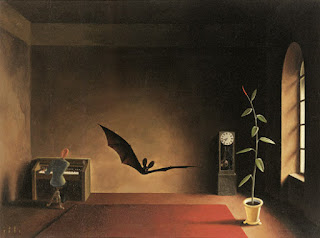I’m going straight to the pies:
Once acknowledge that an American pie is far to be preferred to its humble ancestor, the English tart, and it is joyful to be reassured at a Bowden reunion that invention has not yet failed.
This is near the end of The Country of the Pointed Firs, Chapter XIX. The narrator, Sarah, is at her landlady’s family reunion, part of her acceptance into the community of Dunnet Landing. The sentence is unnecessarily fussy, I admit – "once acknowledge," as if there is doubt, what nonsense, despite Pykk’s claim that “a pie is an object with gravy; a pie without gravy is the thing that appears in the world while the world is waiting for a pie with gravy to arrive; it's a stopgap.” I believe this is the only misjudgment at Pykk. The New England fruit pie is the greatest contribution of the United States to world cuisine that did not originate in the South, making it, overall, something like our 45th greatest contribution.
Never mind that. Read this, this is shocking:
Beside a delightful variety of material, the decorations went beyond all my former experience; dates and names were wrought in lines of pastry and frosting on the tops. There was even more elaborate reading matter on an excellent early-apple pie which we began to share and eat, precept upon precept. Mrs. Todd helped me generously to the whole word BOWDEN, and consumed REUNION herself, save an undecipherable fragment…
They frost their pies! Even more amazing: they read their pies! And the pies are not even the most impressive pastries:
the most renowned essay in cookery on the tables was a model of the old Bowden house made of durable gingerbread, with all the windows and doors in the right places, and sprigs of genuine lilac set at the front. It must have been baked in sections, in one of the last of the great brick ovens, and fastened together on the morning of the day. There was a general sigh when this fell into ruin at the feast's end, and it was shared by a great part of the assembly, not without seriousness, and as if it were a pledge and token of loyalty. I met the maker of the gingerbread house, which had called up lively remembrances of a childish story. She had the gleaming eye of an enthusiast and a look of high ideals.
"I could just as well have made it all of frosted cake," she said, "but 'twouldn't have been the right shade; the old house, as you observe, was never painted, and I concluded that plain gingerbread would represent it best. It wasn't all I expected it would be," she said sadly, as many an artist had said before her of his work.
Now, it is obvious that I am cheating, taking the day off, not really writing a thing, just copying huge gobs of text, but this is the finest passage in the novel and what could I do but single it out. I mean, “not without seriousness”; “the gleaming eye of an enthusiast.” The gingerbread house baker never appears before in the book nor is she seen again after her sublime lament, the new motto of Wuthering Expectations. “It wasn't all I expected it would be.” It never is.

